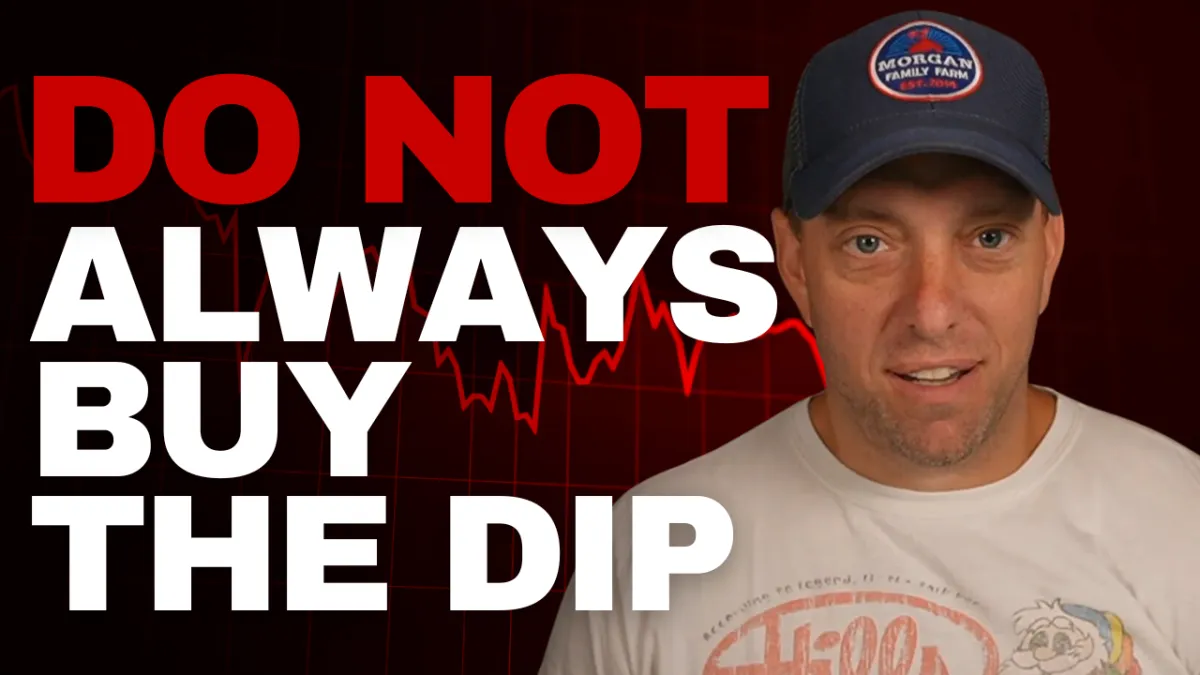
"Always Buy the Dip" (...?)
Few pieces of investing advice are as ubiquitous as "buy the dip." It's plastered across financial news networks, echoed by ‘finance gurus’ on social media, and repeated ad nauseam by countless financial advisors. Seems simple: when stock prices fall, it's an opportunity to buy more at a discount.
Watch This Episode Here:
The Problem with "One Size Fits All" Advice
First and foremost, "buy the dip" is a blanket statement that fails to consider individual circumstances. Your financial situation, risk tolerance, and investment goals are unique to you. What might be a good move for a young professional with decades until retirement could be disastrous for someone nearing their golden years. This advice often ignores crucial factors such as:
- Your current asset allocation
- Your cash flow situation
- Potential tax implications of buying more stocks
- The opportunity cost of using funds to buy stocks instead of other investments
The Missing Piece: Fundamental Analysis
When you hear someone advise to "buy the dip," ask yourself this: have they mentioned a single company name? Have they discussed any performance metrics or balance sheets? The answer is probably no. A discount necessarily means a known value from which the discount is derived; that the price was once higher than it is now is not basis to declare the current lesser valuation is discounted and will soon achieve the original higher price again. None of this can be stated with even a hint of certainty, but it is the entire foundation of the financial planning model- it is impossible to escape projections and strategies which presume ever-increasing market returns over the long term. The degree to which that is true must be a reflection of a force other than value creation; we can say confidently that is the Fed which drives this asset price inflation, thus we must also conclude they have the ability to wipe it out with a stroke of the policy pen, should their survival depend on it.
Real investment wisdom comes from understanding what you're buying. A dip in stock price doesn't automatically mean a good deal. Sometimes, prices fall for good reasons – perhaps a company's fundamentals have weakened, or its industry is facing significant challenges. Buying without this analysis is akin to shopping blindfolded; you might get a bargain, or you might be catching a falling knife.
Is a Dip Always Just a Dip?
The "buy the dip" mentality assumes that all market downturns are temporary and that prices will inevitably rise again. There is no consideration or provision for the fact that inherent market upward mobility is not a given. If you are going to buy into a dip, it should not be because it is a dip but rather well-considered analysis that happens to coincide with a 'dip.' Can you know the answers to these questions:
· How long will this dip last?
· What caused the dip in the first place?
· Where is the price likely to go from here?
Without clear answers to these questions, buying the dip becomes more of a gamble than an investment strategy. Clear answers being raw speculation at best, the current mean outcomes of retirees make sense.
Why is this advice so popular? It taps into our psychological desire for simplicity and our fear of missing out. It feels proactive – we're doing something in response to market movements. It also plays on our innate desire to get a good deal.
At the end of the day, the ones who benefit from this advice are the financial institutions that profit from increased trading activity and asset management fees. If you're purchasing equities, do so in an educated manner irrespective of 'the dip.'
Conclusion: Think Critically About Your Investments
“Buying the dip" is an oversimplification of a complex decision. Successful investing requires critical thinking, thorough analysis, and a personalized approach that aligns with your financial goals and circumstances.
Your financial future is too important to base on a catchy phrase. Take the time to understand your investments, consider your personal situation, and make informed decisions that go beyond simplistic market timing strategies.
